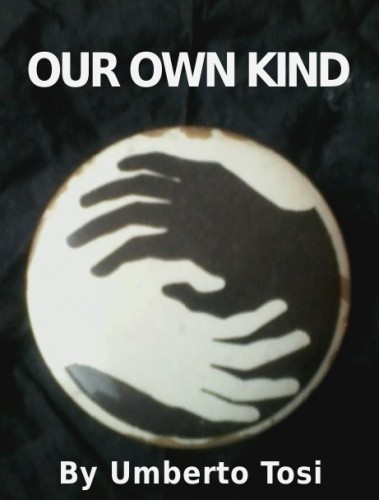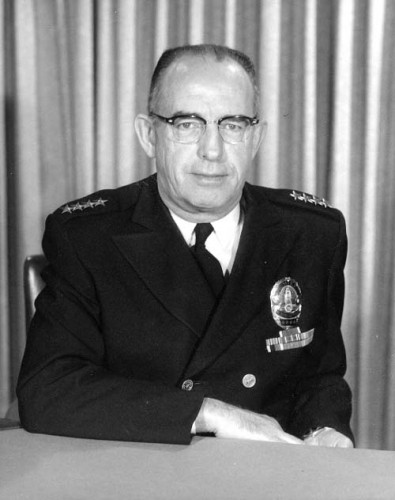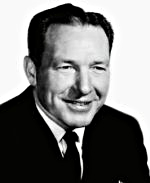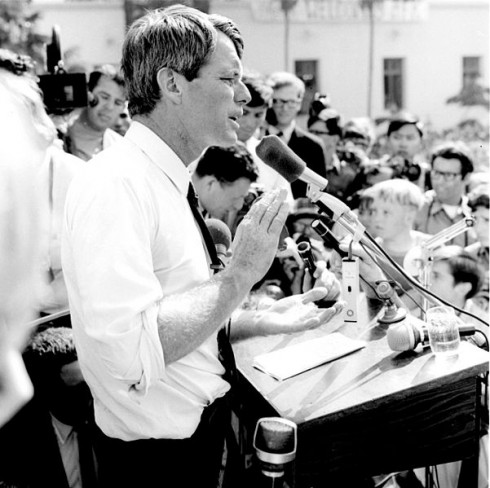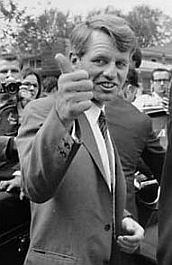Umberto Tosi’s ’60s Yarn Continues With Chapter 13; Shotgun Psychos
(Umberto Tosi, author of Ophelia Rising, was an editor and staff writer for the Los Angeles Times from 1959-1971.)
Detective Sergeant Jacob Imhoff was just another burned out cop, tough-but-fair, maybe a decent guy, hard to read. Roy could see all that – and knew what else.
They sit opposite each other in a booth at the back of Clifton’s Cafeteria on Broadway near Sixth Street, a place with a history, catering to mixed downtown clientele of drifters, downtown workers and tourists. It’s unfrequented by cops or newsmen, which makes it a good spot to meet. Roy examines Imhoff’s fleshy face for clues. With his graying crew cut and massive shoulders, Imhoff resembles an ICBM emerging from its silo. Imhoff plays off of his bulk and a striking homeliness that he’s made into an asset, alternating between King Kong and the Jolly Green Giant, menacing or jovial, always imposing.
Roy keeps his mouth shut about what he his not supposed to know. Not that he cares about the closet where Imhoff keeps his sexuality hidden, well behind freely thrown epithets about Hollywood being “full of fags and fairies.” Roy knows a lot, not all of it useful.
Roy trusts him warily as a source. Imhoff is more like the bent, worn cops Roy knew back in Brooklyn, not like one of L.A. chief Parker’s scrubbed, storm troopers. Roy can detect Imhoff’s contempt for the officious chief, who had “cleaned up” L.A.’s conventional, play-for-paycorruption years earlier, only to replace it with something more insidious – running his force by the Machiavellian precept that it is better to be feared than loved. Parker manages the LAPD as a mobile force strike force, insulated in squad cars, once removed from a populace it intimidates more than protects, particularly the black and brown sectors of that populace. The force is mobile and technocratic, but traditional in that it’s primary role is to protect the rich from the poor.
Unlike older cities, Los Angeles suburbanite communities have the room to stand apart with little overlap between rich and poor. The cops of Parker force, with insufficient numbers to really police L.A’s sprawl,, keeps moving in its patrol cars, freeway-alienated to its constituents – pretty much as Angelenos are from. each other. They are ordinary cops, some good, a few bad, working stiffs – not the enemy. They sign up to keep law and order, but become surrogates – thrust into an impossible hit-and-miss counterinsurgency with indigenous gangs, abandoning any pretense of protecting of everyday black and brown neighborhood citizens caught in the crossfire. Intimidate first, ask questions later, and if this involves cracking heads and an undercurrent of racism, so be it. Parker and the Prince forgot to ask what devolves from instilling fear so successfully, loathing.
CHIEF PARKER, PROTECTOR OF THE RICH AND POWERFUL
MAYOR SAM YORTY
A passage from Howard Thurman’s Jesus and the Disinherited comes to Roy’s mind about “the ever present fear that confronts the poor,” about how living under a constant threat of violence “attacks the fundamental sense of self-respect and personal dignity,” how fear of violence boxes in the poor from enjoying freedoms the majority takes for granted – going to school, employment, building social networks, how it engenders seething outrage. “There are few things more devastating than to have it burned into you that you do not count and that no provisions are made for the literal protection of your person.”
Roy muses at the irony of L.A.’s tin horn Mayor Sam Yorty and Chief Parker putting Senator Robert F. Kennedy in a very similarly exposed position at that very moment by holding back police protection as the senator wades into crowds all over Los Angeles campaigning for President.
ROBERT KENNEDY, CAMPAIGNING AND EXPOSED IN LOS ANGELES, 1968
It is Roy’s gift and misfortune to be a member of that vanishing breed of enterprising, investigative reporters rather than a talking head. He never lets things go at that. He has to put his nose where it’s not wanted and ask rude questions. Roy enjoys it, perversely. He like works the gaps and wedging the cracks in walls. He finds his sources on the dark streets and behind the facades of the powerful. It’s a given that the best sources have axes to grind. Practically everyone does, like Imhoff, who has one foot in Hollywood.
“You and I, Roy,” Imhoff snorts. “We’re in the same business, you know.”
“How’s that?”
“Entertainment.”
Roy isn’t big on show biz, but even he knows that Imhoff already is too old to get anywhere with Hollywood’s boy-apparchiks. But, what the hell? Roy was doing no better with the gray-faced editorial apparachicks upstairs at the Times. Better to humor Imhoff. “Should I count this as research for your next script”
“Whatever. Now. You didn’t just meet me here for the Salisbury steak. What do you want.”
“I hear you got fucked again by City Hall. You wanted in on the Bobby Kennedy detail, but Yorty and your boss Parker decided to deny any police protections to JFK’s brother, Senator Robert F. Kennedy, who is odds-on favorite to become our next President. Can you confirm that?”
“Fucking fag Gordy’s got a big mouth.”
“The better to suck your cock with, my dear.”
“Fuck off.”
“So it’s true.”
“The part about Yorty pulling the Kennedy detail. Yeah. That’s true all right. Bastard.”
“Sonofabitch. Why do you think that is? Any talk down at headquarters?”
“Shit. Yorty just takes orders from those wing nut millionaires who pay for his way up the ladder. He’s the kind of weasel they like. Does what he’s told.”
“And they would want Bobby Kennedy running around Los Angeles unprotected?”
“They want him to limit his campaign, maybe lose the primary because of that. Or maybe more than that.”
Imhoff shovels forkfuls of Salisbury steak, heavy with translucent gravy, past his oddly sensuous lips. He doesn’t chew much. Roy can’t read the mood of Imhoff’s slit eyes or if they are brown, green or gray, only that they size him up constantly out of habit, watchful as a cat at a mouse-hole.
“So, what do you know about the that nut job who marches around downtown hollering doom, wearing a brassiere on his head, the one they call Preacher Man?”
“You mean, ‘you’re-gonna-go to-hell.’ Zeke Ludlow? Yeah. Don’t you guys know anything there in that Daily Mausoleum over there?”
“Is he dangerous?”
“No more or less than any nut job. Maybe he’s right; we’re all going to hell. Maybe we’re there already.”
“He’s got a gun.”
“So what? Maybe he wants to put himself out of his misery.
“Maybe. But somebody told me this Zeke character has been talking crazy about Bobby Kennedy while he waves a gun around.”
“Just an act. I wouldn’t worry about that asshole. He’s crazy like a fox.”
“What do you mean?”
“Drop it.”
“My source says a black sedan picked him up in a alley, very mysteriously. He says the car belongs to a certain Jeb Crowley. Do you know what’s that about?”
“You got nothing there. Probably a friend.” Imhoff starts on his mashed potatoes, sipping Jack Daniels between bites.
“Does Zeke have a record. Does he work for LAPD?” Roy fishes. “Off the record.”
Imhoff puts down his drink. Roy notices the sweat on his upper lip. “Off the record, maybe.”
“An informant?”
“Don’t go there. You’re out of your depth, boy. He’s just another burned out hippie who dropped too much acid, got into meth, then got god-crazy bible thumping religion.”
“Pick your poison. How about another round?” Roy signals a waiter. Booze and mashed potatoes seem to loosen Imhoff’s tongue.
A busboy arrives – smallish, trim, Middle-Eastern looking, even-featured, with dark, vacant eyes, black wavy hair. “May I help you?” The man has faint accent that Roy can’t place. The name tag says “Sirhan.” Imhoff scowls at him.
Roy tells him to get a waiter for another round. “Come on, Imhoff, give me something more here, off the record. Okay?”
“Off the record, Zeke is a stooge for Crowley, and the Rheebus Brother, big John Birch Society backers down in Orange County, got their fingers in everything from missiles to oil.”
“What do they want with a loser like Zeke?”
“Just a side bet. Crowley put money in this cult church for hippies, to bring them all to Jesus – his version. Zeke was pastor, but then went off the deep end – I mean the deep end of the deep end – comes down here hollering about the Apocalypse, giving everyone a headache.”
“What’s that got to do with Bobby Kennedy?”
“Maybe nothing really. But you know Crowley and that crowd hate the Kennedys, especially Bobby.”
“Take a number. Get in line.”
“Worse, since Bobby’s gone peacenik and brotherhood, picking up on Martin Luther King – and the black vote.”
“Just politics?”
“Not to them. They’re all nuttier than sand fleas. Worse than any Preacher Man, but with unlimited cash, and a lot of weight to throw around.” A waiter brings their drinks.
Roy lights a Camel. “Bobby’s all over Los Angeles campaigning. A California win will be his ticket to the White House.”
Imhoff tops off his fresh drink with the last drops of his old one. “That is … if nothing happens to him.”
“You’re saying?”
“Isn’t it obvious. Nobody’s minding the store, unless you count the pair of black bookends Bobby’s hired as his so-called bodyguards — for show down in Watts – Rosey Grier and Rafer Johnson.” Imhoff snorts, “an over-the-hill football fatso and a track-and-field fairy, couldn’t bodyguard my ass. No Secret Service either. How convenient.”
“What about feds?”
J. Edgar doesn’t ever want Bobby as his boss again.” Imhoff leans forward and whispers with boozy breath. “What to hear something hot? This guy, Oliver Kyle. You heard of him? He’s an FBI factotum – probably helps Hoover unlace corsets after work too. The other day, I hear, at FBI headquarters, Kyle says – get this — out loud, right in the office, ‘I hope someone shoots and kills the son of a bitch’ – meaning Bobby Kennedy.”
“How do you know this?” Roy draws down his Camel.
“Let’s just say a little FBI birdie, who I used to work with here, told me.”
“And you say to forget Zeke?”
Imhoff is getting bleary now. “I’ve already said too much.”
“What if there’s something to this. You’re a cop. What are you going to do.”
“If your nut-job Zeke is even serious – which is improbable – he’d just be a fall guy. You don’t get how big boys play? No conspiracies, no chain of evidence, no connections.”
“Then what? How?”
“They don’t order a hit. It’s not like some mafia shit. They just pull strings and set things in motion. They open the doors and let the dogs loose. Poke all the wackos in any given town and a dozen of them come out of the woodwork with guns looking glory. It doesn’t take much. A little extra cash to the usual hate mongers, pressure here and there. Feed the paranoia out there, and, bang, the crazies go off in all directions like buckshot. Most of them miss, but only one of them has to get through…and, voila, you’ve got your – ha-ha – lone assassin” – with maybe some backup just in case.”
Comments
Leave a Reply
You must be logged in to post a comment.

